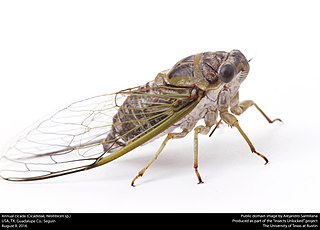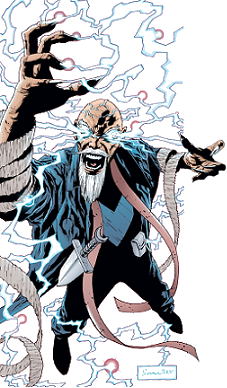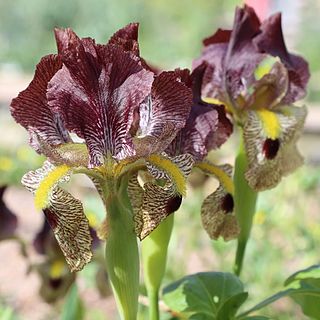
Bagpipes are a woodwind instrument using enclosed reeds fed from a constant reservoir of air in the form of a bag. The Great Highland bagpipes are well known, but people have played bagpipes for centuries throughout large parts of Europe, Northern Africa, Western Asia, around the Persian Gulf and northern parts of South Asia.

The cicadas are a superfamily, the Cicadoidea, of insects in the order Hemiptera. They are in the suborder Auchenorrhyncha, along with smaller jumping bugs such as leafhoppers and froghoppers. The superfamily is divided into two families, the Tettigarctidae, with two species in Australia, and the Cicadidae, with more than 3,000 species described from around the world; many species remain undescribed.

The great Highland bagpipe is a type of bagpipe native to Scotland, and the Scottish analogue to the great Irish warpipes. It has acquired widespread recognition through its usage in the British military and in pipe bands throughout the world.

Vitellaria paradoxa, commonly known as shea tree, shi tree, or vitellaria, is a tree of the family Sapotaceae. It is the only species in the genus Vitellaria, and is indigenous to Africa.

The term periodical cicada is commonly used to refer to any of the seven species of the genus Magicicada of eastern North America, the 13- and 17-year cicadas. They are called periodical because nearly all individuals in a local population are developmentally synchronized and emerge in the same year. Although they are sometimes called "locusts", this is a misnomer, as cicadas belong to the taxonomic order Hemiptera, suborder Auchenorrhyncha, while locusts are grasshoppers belonging to the order Orthoptera. Magicicada belongs to the cicada tribe Lamotialnini, a group of genera with representatives in Australia, Africa, and Asia, as well as the Americas.

The South American lungfish, also known as the American mud-fish and scaly salamanderfish. is the single species of lungfish found in swamps and slow-moving waters of the Amazon, Paraguay, and lower Paraná River basins in South America. Notable as an obligate air-breather, it is the sole member of its family Lepidosirenidae, although some authors also place Protopterus in the family. In Brazil, it is known by the indigenous language Tupi name piramboia, which means "snake-fish", and synonyms pirarucu-bóia, traíra-bóia, and caramuru.

Cicadidae, the true cicadas, is the largest family of cicadas, with more than 3,200 species worldwide. The oldest known definitive fossils are from the Paleocene, a nymph from the Cretaceous Burmese amber has been attributed to the family, but could also belong to the Tettigarctidae.

Alan Michael Ritchson is an American actor, model, singer, songwriter and producer. He made his acting debut as Aquaman / Arthur Curry on The CW superhero series Smallville (2005–2010), where he appeared as a guest star between the fifth and tenth seasons. Ritchson gained further prominence for portraying Thad Castle on the Spike TV sitcom Blue Mountain State (2010–2012), a role he reprised in the 2016 film sequel. He also headlined the SyFy action series Blood Drive (2017). In 2018, he returned to superhero television as Hank Hall / Hawk on the DC Universe / HBO Max series Titans. Ritchson left Titans in 2021 and, in 2022, began portraying the title character on the Amazon Prime Video series Reacher.

The Auchenorrhyncha suborder of the Hemiptera contains most of the familiar members of what was called the "Homoptera" – groups such as cicadas, leafhoppers, treehoppers, planthoppers, and spittlebugs. The aphids and scale insects are the other well-known "Homoptera", and they are in the suborder Sternorrhyncha.

Cicada is a fictional character appearing in American comic books published by DC Comics.

Acacia paradoxa is a plant in the family Fabaceae. Its common names include kangaroo acacia, kangaroo thorn, prickly wattle, hedge wattle and paradox acacia.

The Cicadinae are a subfamily of cicadas, containing the translucent cicadas. They are robust cicadas and many have gaudy colors, but they generally lack the butterfly-like opaque wing markings found in many species of the related Tibiceninae.

Magicicada cassini, known as the 17-year cicada, Cassin's periodical cicada or the dwarf periodical cicada, is a species of periodical cicada. It is endemic to North America. It has a 17-year life cycle but is otherwise indistinguishable from the 13-year periodical cicada Magicicada tredecassini. The two species are usually discussed together as "cassini periodical cicadas" or "cassini-type periodical cicadas." Unlike other periodical cicadas, cassini-type males may synchronize their courting behavior so that tens of thousands of males sing and fly in unison. The species was first reported to the Academy of Natural Sciences of Philadelphia by Margaretta Morris in 1846. In 1852, the species was formally described by J. C. Fisher and given the specific name cassini in honour of John Cassin, an American ornithologist, whose own report was included by Fisher in his publication.

Cicada 3301 is a nickname given to three sets of puzzles posted under the name "3301" online between 2012 and 2014. This started on January 2nd, 2012 and ran for nearly a month. A second round began one year later on January 4, 2013, and then a third round following the confirmation of a fresh clue posted on Twitter on January 4, 2014. The third puzzle has yet to be solved. The stated intent was to recruit "intelligent individuals" by presenting a series of puzzles to be solved; no new puzzles were published on January 4, 2015. A new clue was posted on Twitter on January 5, 2016. Cicada 3301 posted their last verified OpenPGP-signed message in April 2017, denying the validity of any unsigned puzzle.

Iris paradoxa is a species of flowering plant native to western Asia. It has large upright petals and smaller lower petals, which is unique amongst most iris forms. They come in various shades from white, lavender, mauve, medium purple, violet, dark purple to black. It has a black or purplish black beard on the lower petals. It comes from the region of Transcaucasia, and is found in the countries of Iran,, Turkey, Armenia and in Azerbaijan.

Rhipiceridae is a family of beetles found worldwide. The larva of rhipicerids are parasitoids of cicada nymphs. Rhipiceridae and Dascillidae form the super family Dascilloidea, within the Elateriformia.
Prasiini is a tribe of cicadas in the family Cicadidae. There are about 9 genera and at least 50 described species in Prasiini, found in tropical Africa, Australasia, and the Neotropics.

Straight Outta Nowhere: Scooby-Doo! Meets Courage the Cowardly Dog is a 2021 American animated comedy film produced by Warner Bros. Animation, and is the thirty-sixth entry in the direct-to-video series of Scooby-Doo films. The film is a crossover between Scooby-Doo and the Cartoon Network show Courage the Cowardly Dog. The film was released on DVD and Digital on September 14, 2021.
















